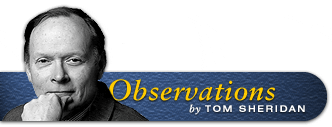Democracy’s mess
Democracy is a wonderful thing. It’s worth fighting for, and celebrating.
But democracy also is wonderfully messy. Not to mention frustrating.
That’s hardly criticism. Still, democracy’s messy and sometimes frustrating nature may take some getting used to.
Consider the case of Abdul Rahman, the 41-year-old Afghan medical aid worker who, impressed by the faith of the Christian volunteers he worked with, converted from his native Muslim faith to follow Jesus Christ.
That’s a good thing. Unless you’re an Afghan. Then it’s considered apostasy for which the punishment is death.
Afghanistan is a democracy. Or a budding one, at least. Freed, mostly, from the yoke of the Taliban by U.S. troops following 9/11, the country has held elections—which are also a good thing. We’ve praised the nation for that, and for the efforts of its citizens to vote … from which we could take a lesson.
Apparently enshrined in that country’s constitution is a little thing we might call religious intolerance. Or at least intolerance toward any religion except Islam. (But we might remember that slavery once was the law in the good old U.S. of A.; abortion still is.)
Besides, Afghanis are hardly the first to practice such intolerance.
For a long time Catholicism was disparaged or only grudgingly endured in our own country. It’s still viewed with suspicion by some.
The latest news out of Kabul was that after international griping Rahman’s case has been dropped. (After some explained that he had to have been crazy to become a Christian … and being crazy apparently can get you off, even in Afghanistan.)
Even leaving the country for asylum elsewhere may not save him, though, since radical clerics have called for his death wherever he goes. (Before we express astonishment at that, we’ve got our own death-calling radical clerics—Helloooo, Pat Robertson? Nice to know that Afghan democracy and ours have such similarities.)
And in a delicious burst of irony, our own democratic government called for Rahman’s release—even though we wince when other nations hint that we give up our cherished death penalty, or suggest that we submit to such international niceties as the World Court. We tell them firmly, but diplomatically, “Butt out!”
Democracy IS messy, you see, but it helps to recognize that democracy is a work in progress, always developing, never quite finished.
That’s helpful as we look at the ongoing and ugly debate over immigration, “illegal” (undocumented) aliens and the position the Catholic Church is taking in the struggle.
Much to the chagrin of many Catholics (see Letters, Page 9) the church is pressing for Congress to significantly reform our immigration policies. This is especially true following a measure advancing the U.S. House which would make it a crime to assist undocumented immigrants, even with basic human needs.
Because democracy—ever messy—is never a finished project, it remains open to change. And wiser minds may yet prevail.
That’s hopeful, since the bishops recognize that we are a nation of immigrants, a church of immigrants and a people forever on a journey. They remind us that we’re tied more closely together than ever before in our human history. Democracy should be able to respond to the statement of the Illinois bishops on immigration (see Page 6). It says, in part, “These undocumented immigrants are our friends, our neighbors, our fellow human beings bound to us by a common humanity. Any just response to immigration reform must be rooted in the recognition that, ultimately, we are one human family.”
Let’s hope the everyday democracy-bound Afghan gets that understanding, even if the more radical clerics don’t. If they can handle the messiness, so should we.
Tom Sheridan
Editor and General Manager







